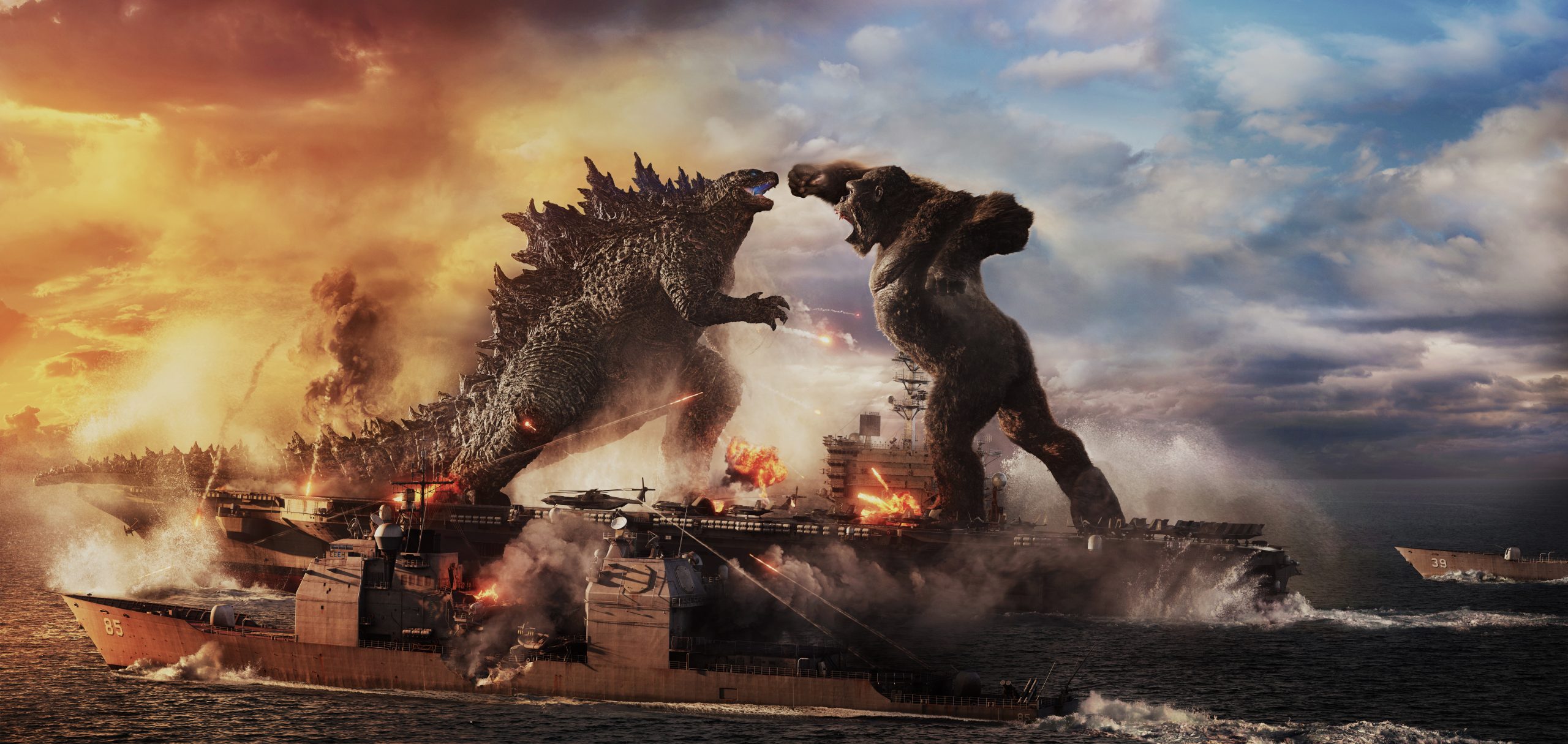
There was only one thing that really mattered going into the latest film in the MonsterVerse: would the titular fight be worth the six-year wait? Thankfully, the answer is a resounding yes! Unfortunately, this isn’t exactly the home run it could have been.
You don’t really want a recap of the events that led to this titanic fight, and neither should you, because Godzilla vs. Kong does a decent job of recapping the important events of the franchise during its opening credits, and then has countless human characters repeat the plot to the audience approximately a billion times during the actual movie. What matters is that Godzilla starts attacking cities again, and no one knows why. The only solution that comes up is to use Kong as a guide to the “Hollow Earth” or a habitable pocket within the planet’s core containing an immense energy source that can defeat Godzilla. In the meantime, yet another sinister corporation starts to work on something that may bring doom to humanity, all in the name of empowering it.
In many ways, Adam Wingard‘s take on the MonsterVerse is more of a sequel to Kong: Skull Island than to Godzilla: King of the Monsters and Kong is far more of a protagonist than Godzilla. For one the excellent VFX work gives the giant ape an ability to express enough emotion that you’d think you’re watching Andy Serkis steal your heart as Caesar in Planet of the Apes. This Kong feels loneliness, confusion, and quite a lot of anger. He also gets the closest the film ever gets to a proper character arc, as Kong goes in search of a place to call home after Skull Island was all but destroyed during an off-screen storm. His relationship with Jia (Kaylee Hottle), a deaf Iwi girl Kong shares a close bond with, is also the closest the film gets to having actual pathos — they are two orphaned natives being used as pawns by would-be white savior and rogue geologist Nathan Lind (Alexander Skarsgård).

Not that Godzilla isn’t a star in his own right; he gets plenty of time to shine during the many action scenes, he’s just not as much the focus of the film as Kong is. Still, when the fight begins, everyone wins. The choreography and directing make the big-ticket fights easy to follow and fun to watch. Perhaps the best thing to be said about Godzilla vs. Kong is that both kaiju have enough weight to them to feel fittingly titanic, and Wingard gives every punch and atomic breath consequence and impact — not only in how they hurt each other but in the annihilation, they cause around them. You truly feel like an ant staring at a full-grown adult paying no attention to you while it tramples you. It’s genuinely terrifying to see Godzilla hurl Kong around Hong Kong like they are wrestlers fighting in a ring at Wrestlemania, but it’s also incredibly cool. Sadly, that’s just half of the movie.
A big part of the discourse before the film premiered was around the human characters and whether anyone truly cares about the pesky humans in a kaiju film. Though something rings true about the human characters being a secondary thought in a film about giant kaiju, it becomes a problem when the pesky humans take up the vast majority of the film’s runtime and are the ones to drive the plot. Half of the film is devoted to returning character Madison Russell (Millie Bobby Brown), now in high school, and obsessed with a conspiracy theory podcast run by Bernie Hayes (Brian Tyree Henry). Together with Madison’s friend Josh (Julian Dennison), the three try to sneak into a facility where the dastardly and deliciously over-the-top billionaire Walter Simmons (Demián Bichir) is working on something that may save humanity. Though Henry provides some fun and effective comic relief, this subplot is little more than a table setting for the big third act fight, and a boring table setting at that. If the film wanted us to find out the bad guy’s plan, why not have the bad guy’s employee in the other subplot (Skarsgård) relay the necessary information and cut the excess characters? If the human characters don’t matter in a Godzilla and Kong movie, why are there so many of them?
The other subplot is far more effective, though still very much unnecessary beyond just a contrived way of padding the runtime. Dr. Ilene Andrews (Rebecca Hall), and Jia accompany Nathan Lind and Eiza González‘s Maya Simmons as they try to get Kong to show them the way to the center of the Earth to find the McGuffin that can maybe defeat Godzilla.

It’s unfortunate that the MonsterVerse still hasn’t found a way to introduce human characters with any agency or importance other than moving us from one plot point to the next (the exception being Skull Island, still the best of the series so far). The best monster movies engage us with huge fights, but keep us invested with human emotions that support the giant fights. Godzilla Vs Kong feels exceptionally worse in this regard, with only one character having any sort of pathos, and the rest being there just to explain what’s going on. This even extends to the score itself, with Junkie XL delivering a synth-heavy score that lacks the melodic and meditative undertone of Bear McCreary’s King of the Monsters score, or Alexandre Deplat’s operatic score for Godzilla.
Godzilla vs. Kong had one job, to deliver a bombastic, blood-pumping, hype-worthy fight between two absolute icons of cinema, and it absolutely delivers on that front. Unfortunately, the film cuts away to its human characters so much that you start to believe they matter to the film, only to realize they do very little other than distract you from the big monsters hitting each other in the face.




I haven’t gotten around to watching this yet but I’m super excited